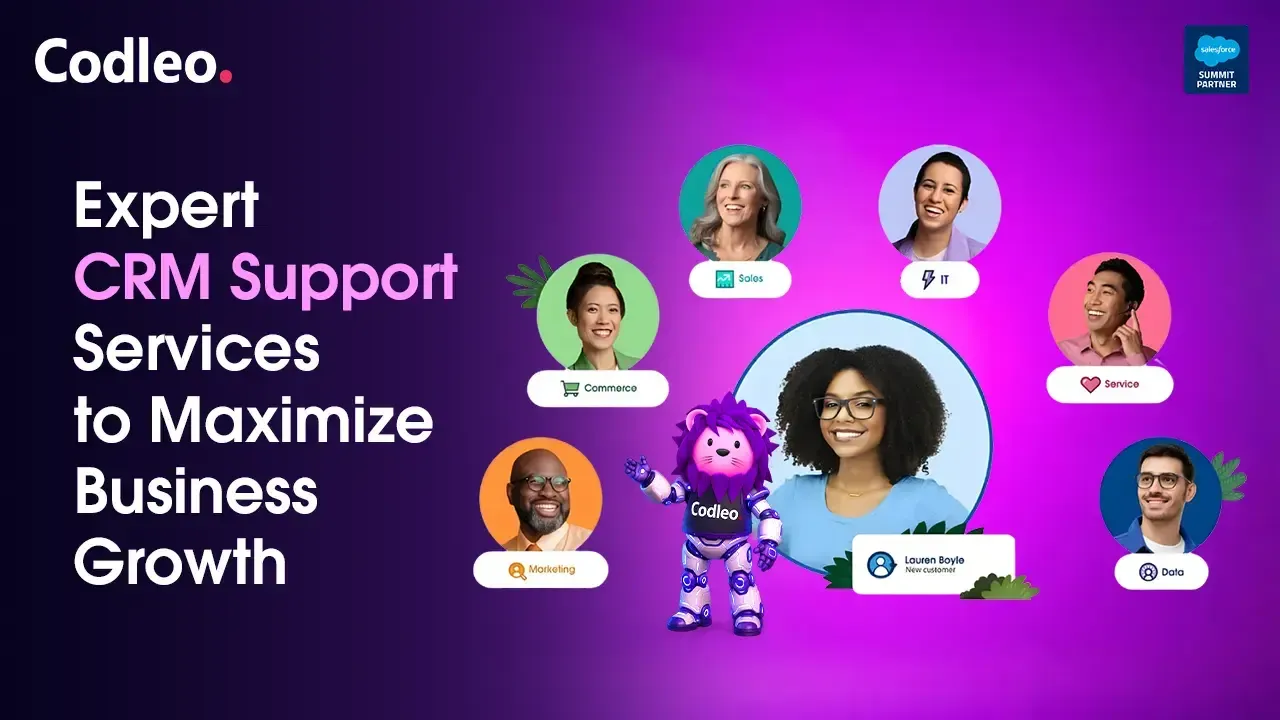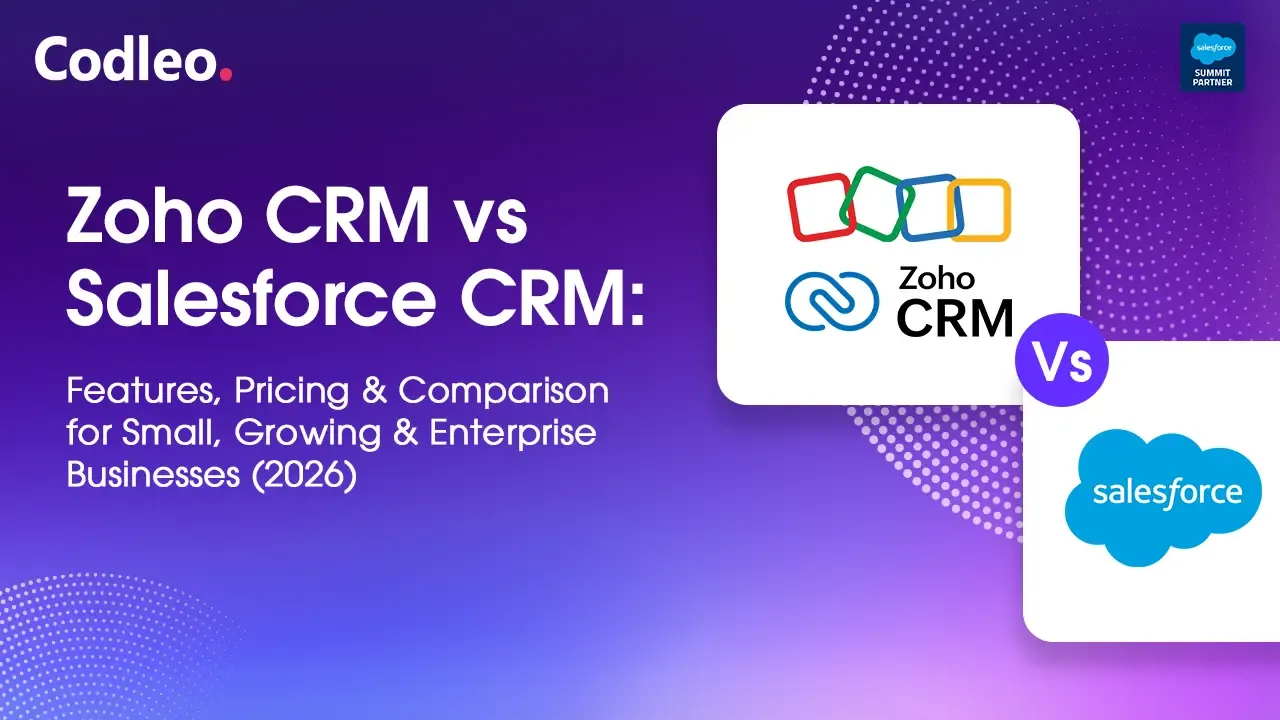Publish date:
In 2026, digital transformation is essential for survival. Businesses need data, automation, and a good customer experience to succeed in a connected economy. However, many companies still use separate tools that do not work together, creating data gaps and inefficiencies.
Salesforce integration connects Salesforce CRM with the software your business uses, such as accounting, marketing, ERP, and customer service. This connection creates a smooth digital environment for your business.
Instead of working in separate groups, every department uses a single source of truth. It helps them make quicker decisions, build stronger relationships, and grow effectively. Integrating Salesforce changes how modern businesses work by simplifying complexity and turning data into actionable strategies.
Integrating Salesforce with your existing systems is a critical move that requires deep expertise, strategic planning, and technical precision. That’s where a Salesforce integration partner comes in. From data mapping to API management, a skilled partner ensures your integration is smooth, scalable, and future-ready. In this blog, we’ll explore the key business benefits of choosing the right integration expert — and why it could be one of the smartest investments for your CRM success.
What is Salesforce Integration?
Salesforce Integration connects Salesforce with other systems, applications, or data sources. This connection keeps information up to date, consistent, and accessible to all teams. Instead of working in silos, everyone in the organization relies on a single, reliable source of information, whether it’s customer data, financial records, or marketing interactions.
Common Examples of Specific Integration Needs:
-
ERP Platforms: Syn orders, invoices, and product data like SAP, NetSuite, Oracle, etc.
-
Payment Gateways: Track transactions in real-time, like PayPal, Stripe, Recurly, etc.
-
Marketing Automation tools: Run unified campaigns and generate more leads for the sales pipeline. The most commonly utilized tools are Marketo, HubSpot, Pardot, MailChimp, etc.
-
Data Warehouses & Analytics: Enable reporting and predictive insights. Snowflake, AWS, Tableau, and BigQuery are some of the tools that businesses integrate.
-
Collaboration platforms: Improve internal team communication and productivity by integrating tools such as Slack, Microsoft Teams, and similar tools.
Integrating with Salesforce is not just a one-time effort. It requires ongoing work to enhance the customer experience, improve efficiency, and prepare for effective AI use.
Types of Salesforce Integration
Below are the major types of Salesforce integration, each addressing a different aspect of connecting Salesforce with other systems:
1. Data Integration:
Data integration in Salesforce helps keep customer, order, and inventory data consistent across Salesforce and other systems, such as ERP, marketing tools, and eCommerce platforms. It allows for real-time or batch updates, ensuring that all connected systems share the same information.
Standard methods for moving data between systems include using ETL tools like MuleSoft or Informatica to extract, transform, and load data. For teams that want more control, Salesforce APIs (REST, SOAP, or Bulk) allow for direct programming to sync data, especially when the transformation process is simple.
2. Process Integration
Process integration connects workflows between Salesforce and other systems. For example, when you close a support ticket in Salesforce, it can automatically trigger a refund in your finance system. These actions occur without manual input and are typically configured using tools such as Salesforce Flow Builder, Apex callouts, or outbound messaging.
For more complex situations, middleware and event-driven systems (like Platform Events or Change Data Capture) help manage workflows and handle errors as needed.
3. Application Integration
This integration brings together the functions of different applications into a smooth business system. You can connect Salesforce to a CPQ engine, a loyalty platform, or a learning management system. The goal is to create a unified experience, not just to share data.
Complex tasks such as connecting disparate APIs, retrying failed actions, and routing data can be managed with middleware platforms such as MuleSoft and Boomi. Custom API connections are made for particular apps, but sometimes it's simple, like installing an AppExchange connector. MuleSoft Composer may be a good choice for straightforward integration requirements requiring little coding.
4. User Interface Integration
By giving customers a seamless experience, user interface integration benefits businesses. Users can access a variety of tools directly within Salesforce without switching between systems.
You can integrate a payment gateway's dashboard into a Lightning page using a Canvas app, or you can show external inventory data using Salesforce Connect External Objects. AppExchange apps often add their user interface elements, such as dialers and chat tools, to Salesforce. It creates a seamless experience with minimal effort.
5. Batch Integration
Batch integration is a method for how integrations run over time. Instead of updating data immediately, it processes data at set intervals. This approach works well for large amounts of data or low-priority tasks, such as updating overnight data warehouses or preparing weekly reports.
Salesforce offers tools like the Bulk API, Data Loader, and Scheduled Apex jobs for managing large amounts of data. External ETL tools also support batch processing, often with features for error handling and progress monitoring.
Benefits of Hiring a Salesforce Integration Services Partner
Integrating Salesforce with your existing systems isn’t just a technical task — it’s a business-critical move that demands expertise, planning, and precision. That’s why many companies turn to a Salesforce integration services partner to ensure a seamless, error-free process. Let’s explore the key benefits of hiring one:
1. Expert-Led Integration, Tailored to Your Business
An experienced Salesforce integration partner doesn’t just plug systems together — they first understand your workflows, pain points, and growth goals. Using Salesforce best practices, they tailor the integration to match your business processes, ensuring long-term scalability and stability.
2. Minimize Downtime, Avoid Glitches
A professional Salesforce integration team ensures the migration and connection of data, apps, and tools happen smoothly — without glitches, crashes, or system downtime. It reduces risk and keeps your operations running without disruption.
3. Cost-Effective for SMBs
Hiring full-time Salesforce developers or in-house experts can be expensive. In contrast, working with a Salesforce integration company gives you access to a team of certified professionals at a fraction of the cost. It is especially valuable for small and mid-sized businesses. Whether you’re a bakery in Kolhapur or a handicraft exporter in Puri, expert integration is now within reach — without draining your budget.
4. Save Internal Resources and IT Bandwidth
Salesforce can be complex and time-consuming for teams unfamiliar with its architecture. Offloading this task to a Salesforce integration specialist prevents your IT team from being overwhelmed and allows your employees to stay focused on core business functions.
5. Industry Expertise with Best Practices
Top integration partners bring domain-specific knowledge. Whether you’re in healthcare, education, or manufacturing, an experienced partner knows the compliance needs, workflows, and industry-specific integrations required to meet your business objectives.
6. Customized Solutions, Not One-Size-Fits-All
Every business is unique — and so are its challenges. The best Salesforce integration consultants design customized strategies rather than using cookie-cutter templates. Their focus is on delivering the right fit that maximizes your ROI and sets your business up for long-term success.
Thought Leadership: A Word from Codleo
"Salesforce Consultants like Codleo carry the best interests of our clients in our hearts. It is our company motto. We go above and beyond to ensure a smooth, glitch-free integration experience. That’s why we’re gaining traction across industries and geographies.”
— Mr. RS Maan, Global CRO, Codleo Consulting
Final Thoughts
Choosing the right Salesforce integration partner isn’t just a technical decision — it’s a strategic one. With the right partner, you can unlock the full potential of Salesforce, streamline your operations, and gain a competitive edge.
Ready to integrate Salesforce the smart way?
Codleo is a trusted Salesforce partner helping businesses like yours achieve seamless integration and long-term success. Let’s discuss how we can simplify your tech stack and drive measurable results.
👉 Schedule a free consultation with our Salesforce experts
Must Read: WHY IS SALESFORCE + GMAIL INTEGRATION A MUST FOR BUSINESSES?















